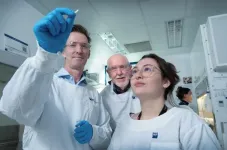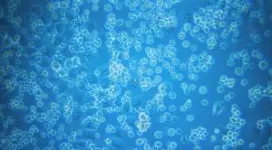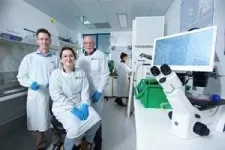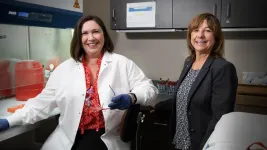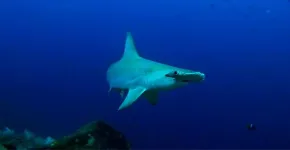(Press-News.org) A booster vaccine using implant technology for koalas is being developed by QUT researchers in the fight against the deadly Chlamydia disease.
The new technology is designed to avoid problems for wild koalas and wildlife handlers having to recapture or hold the animals for 30 days, to receive a second immunisation.
Koala chlamydia is a bacterial infection and is one of the leading causes of death for Australian koalas.
QUT researchers have been successfully testing a two-shot vaccine on an isolated wild koala colony in a five-year treat-and-track study.
The new booster vaccine will be like other drug-eluting implant devices used in humans, slightly larger than a pet microchip.
Professor Ken Beagley, from QUT’s School of Biomedical Science, is leading the research team after being awarded a health grant to develop the technology from the Saving Koalas Fund.
“This technology will significantly increase our ability to vaccinate wild koalas to protect against chlamydial infections, a major cause of infertility and population decline,” Professor Beagley said.
Professor Beagley developed the first koala vaccine for Chlamydia in 2010. Since then, the leading immunologist spearheaded the first immunisations of a wild koala colony in the Gold Coast hinterland after 10 years developing the vaccine in the lab.
Working with Dr Michael Pyne OAM and the team at Currumbin Wildlife Hospital, the project has now resulted in up to 300 vaccinated koalas, with grand joeys being born to healthy females, using a two-shot vaccine approach.
Development of one-shot vaccine implants to further protect koalas against Chlamydia will allow in-the-field vaccination of wild koalas.
“It will also allow all koalas being treated at Currumbin Wildlife hospital and other koala care facilities, to be vaccinated prior to release, without the need to hold the animals for a further 30 days,” he said.
“We want a vaccine that reduces human interference, letting koalas be koalas.”
The implant device is being designed to release the booster at four to five weeks after the first vaccination.
Professor Beagley is working with QUT polymer chemist Professor Tim Dargaville and postdoctoral research fellow Dr Emily Bryan to develop the device.
The grant is worth $749, 687 with the research to be completed by April 2026.
A project partner involves the Currumbin Wildlife Hospital Foundation.
END
Booster shot being developed to avoid recapturing koalas to fight Chlamydia disease
QUT researchers are developing a booster vaccine to “let koalas be koalas” using implant technology in the fight against the deadly Chlamydia disease that’s decimated local colonies.
2023-08-09
ELSE PRESS RELEASES FROM THIS DATE:
After 15 years, pulsar timing yields evidence of cosmic background gravitational waves
2023-08-09
The universe is humming with gravitational radiation — a very low-frequency rumble that rhythmically stretches and compresses spacetime and the matter embedded in it.
That is the conclusion of several groups of researchers from around the world who simultaneously published a slew of journal articles in June describing more than 15 years of observations of millisecond pulsars within our corner of the Milky Way galaxy. At least one group — the North American Nanohertz Observatory for Gravitational Waves (NANOGrav) collaboration — has found compelling ...
Grant provides cancer research training experience to expand workforce for cancer prevention and control
2023-08-09
University of Arizona Cancer Center researchers were awarded a $1.5 million grant from the National Cancer Institute to deliver an intensive, multidisciplinary cancer prevention and control research training program for undergraduate and graduate students.
According to multiple principal investigators Jennifer Bea, PhD, and Cynthia Thomson, PhD, RD, the goal of the 10-week, full-time summer program is to motivate students to pursue a career in cancer prevention science.
“I am very concerned about the number of skilled scientists and clinicians retiring,” said Dr. Bea, co-leader of the UArizona Cancer ...
World’s largest study shows the more you walk, the lower your risk of death, even if you walk fewer than 5,000 steps
2023-08-09
The number of steps you should walk every day to start seeing benefits to your health is lower than previously thought, according to the largest analysis to investigate this.
The study, published in the European Journal of Preventive Cardiology [1] today (Wednesday), found that walking at least 3967 steps a day started to reduce the risk of dying from any cause, and 2337 steps a day reduced the risk of dying from diseases of the heart and blood vessels (cardiovascular disease).
However, the new analysis of 226,889 people from 17 different studies around the world has shown that the more you walk, the greater the health benefits. ...
Theory meets practice
2023-08-09
(Santa Barbara, Calif.) — Scientific findings don’t always translate neatly into actions, especially in conservation and resource management. The disconnect can leave academics and practitioners disheartened and a bit frustrated.
“We want conservation science to be informing real-world needs,” said Darcy Bradley, a senior ocean scientist at The Nature Conservancy and a former director of UC Santa Barbara’s Environmental Markets Lab.
“Most managers and practitioners also want to incorporate science into their work,” ...
$4M NIH grant will test worksite sleep health coaching for Arizona firefighters
2023-08-09
A $4 million award from the National Heart, Lung, and Blood Institute, a division of the National Institutes of Health, will allow researchers in the University of Arizona Mel and Enid Zuckerman College of Public Health to identify key factors for the successful implementation of workplace sleep coaching to improve sleep health in Arizona firefighters.
Almost half of career firefighters report short sleep and poor sleep quality, and about 37% of firefighters screen positive for sleep disorders like sleep apnea, insomnia or ...
Chemical contamination on International Space Station is out of this world
2023-08-09
Concentrations of potentially harmful chemical compounds in dust collected from air filtration systems on the International Space Station (ISS) exceed those found in floor dust from many American homes, a new study reveals.
In the first study of its kind, scientists analysed a sample of dust from air filters within the ISS and found levels of organic contaminants which were higher than the median values found in US and Western European homes.
Publishing their results today in Environmental Science and Technology Letters, researchers from the University of Birmingham, UK, as ...
$150,000 awarded to research race in clinical algorithms
2023-08-09
DALLAS, August 8, 2023 — As part of a focused effort to assess current cardiovascular treatment algorithms for racial bias, the American Heart Association, the single largest non-government supporter of heart and brain health research in the U.S., is funding three new scientific research projects at $50,000 each.
Clinical algorithms are formulas, flow charts and computerized “calculators” that work behind the scenes to analyze health data and help determine a person’s risk for heart disease or guide their ...
New guidance on safe injection practice in hospitals emphasises the importance of prefilled and labelled syringes in avoiding medication errors
2023-08-09
New guidance published in Anaesthesia (the journal of the Association of Anaesthetists) provides clear advice to reduce avoidable errors on all steps of the pathway involving injectable medications used routinely in anaesthesia care. The guidance has been written by a working party of UK anaesthesia experts that include Dr Mike Kinsella, Honorary Consultant, Department of Anaesthesia, University Hospitals Bristol and Weston, Bristol, UK and Chair of the Working Party.
The authors explain: “Peri-operative medication safety is complex. Avoidance of medication ...
Health experts urge clinicians to ‘remain vigilant’ about malaria cases in new commentary
2023-08-08
FOR IMMEDIATE RELEASE
Tuesday, August 8, 2023
Contact:
Michael Saunders, msaunder@bu.edu
Jillian McKoy, jpmckoy@bu.edu
##
As worsening climate change and increased global travel create ideal conditions for a resurgence of malaria in areas where it has long been eradicated, clinicians must be vigilant of the disease’s symptoms and act swiftly once cases are detected, health experts warn in a new commentary published in the Annals of Internal Medicine.
In the last few months, Florida and Texas have reported ...
Inflammation slows malaria parasite growth and reproduction in the body
2023-08-08
Research led by the Peter Doherty Institute for Infection and Immunity (Doherty Institute) and the Kirby Institute found that inflammation in the body can slow down the development of malaria parasites in the bloodstream – a discovery that may constitute a potential new strategy for preventing or limiting severe disease.
A mosquito-borne disease, malaria is caused by Plasmodium parasites, which invade and multiply within red blood cells. Previous research has shown that the parasites can rapidly sense and respond to conditions within the host by intimately syncing with their internal body clocks. While it is known that the body’s nutrient levels and daily circadian rhythms affect ...
LAST 30 PRESS RELEASES:
Hairdressers could be a secret weapon in tackling climate change, new research finds
Genetic risk for mental illness is far less disorder-specific than clinicians have assumed, massive Swedish study reveals
A therapeutic target that would curb the spread of coronaviruses has been identified
Modern twist on wildfire management methods found also to have a bonus feature that protects water supplies
AI enables defect-aware prediction of metal 3D-printed part quality
Miniscule fossil discovery reveals fresh clues into the evolution of the earliest-known relative of all primates
World Water Day 2026: Applied Microbiology International to hold Gender Equality and Water webinar
The unprecedented transformation in energy: The Third Energy Revolution toward carbon neutrality
Building on the far side: AI analysis suggests sturdier foundation for future lunar bases
Far-field superresolution imaging via k-space superoscillation
10 Years, 70% shift: Wastewater upgrades quietly transform river microbiomes
Why does chronic back pain make everyday sounds feel harsher? Brain imaging study points to a treatable cause
Video messaging effectiveness depends on quality of streaming experience, research shows
Introducing the “bloom” cycle, or why plants are not stupid
The Lancet Oncology: Breast cancer remains the most common cancer among women worldwide, with annual cases expected to reach over 3.5 million by 2050
Improve education and transitional support for autistic people to prevent death by suicide, say experts
GLP-1 drugs like Ozempic could cut risk of major heart complications after heart attack, study finds
Study finds Earth may have twice as many vertebrate species as previously thought
NYU Langone orthopedic surgeons present latest clinical findings and research at AAOS 2026
New journal highlights how artificial intelligence can help solve global environmental crises
Study identifies three diverging global AI pathways shaping the future of technology and governance
Machine learning advances non targeted detection of environmental pollutants
ACP advises all adults 75 or older get a protein subunit RSV vaccine
New study finds earliest evidence of big land predators hunting plant-eaters
Newer groundwater associated with higher risk of Parkinson’s disease
New study identifies growth hormone receptor as possible target to improve lung cancer treatment
Routine helps children adjust to school, but harsh parenting may undo benefits
IEEE honors Pitt’s Fang Peng with medal in power engineering
SwRI and the NPSS Consortium release new version of NPSS® software with improved functionality
Study identifies molecular cause of taste loss after COVID
[Press-News.org] Booster shot being developed to avoid recapturing koalas to fight Chlamydia diseaseQUT researchers are developing a booster vaccine to “let koalas be koalas” using implant technology in the fight against the deadly Chlamydia disease that’s decimated local colonies.
